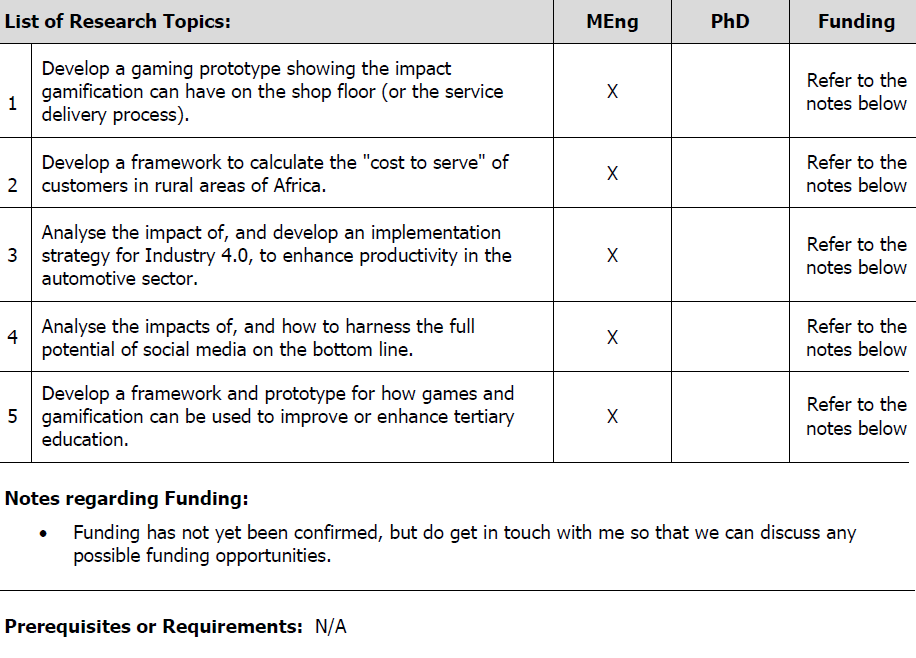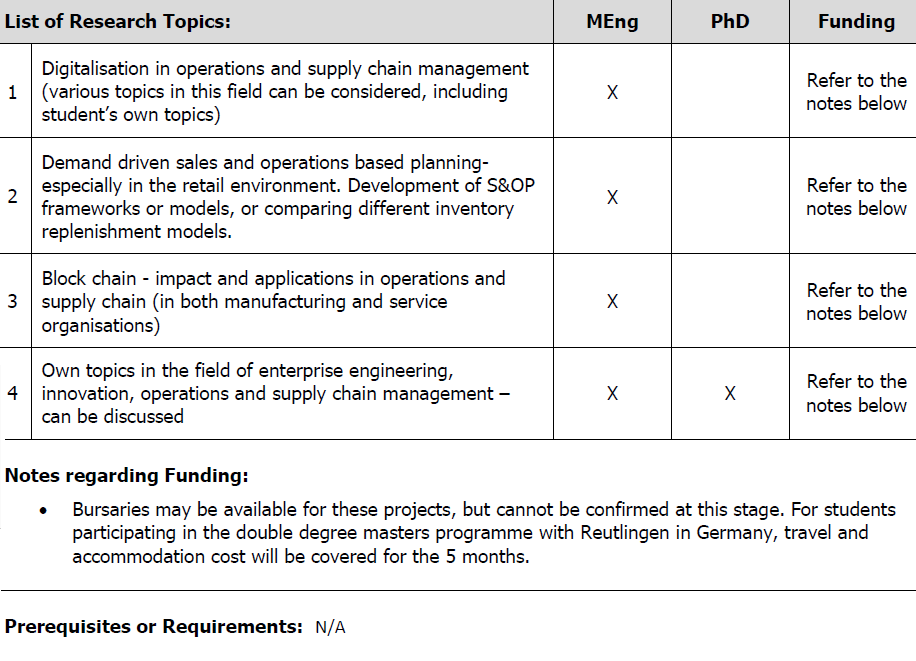
Field of Research:
Sustainable Freight Transport and Supply Chain Management
Lecturer: Dr Joubert van Eeden
Sustainable Freight Transport: The world has an energy problem, not a climate change problem. Humanity need to find cleaner energy to facilitate the global lifestyle, or we must change our behaviour, or accept the consequences. Within global transport and trade this energy problem becomes an energy mobility problem. Most renewable energy forms can “easily” solve industrial and household energy requirements, however transport requires mobility of large quantities of energy. The focus of this research team falls within this Macrologistics space from a Systems Engineering perspective.
Sustainable Freight Transport improvement is possible through a multidisciplinary hierarchical system, i.e. on the first level by avoiding unnecessary inputs (macroeconomics), on the second level by avoiding unnecessary activity (industrial engineering and logistics) and on the third level by improving the efficiency of infrastructure (civil engineering) and equipment (mechanical engineering) used in logistics.
Macrologistics: Macrologistics is the scoping and prioritizing of national policy, projects and macrologistics performance measurement. Macrologistics involves a complex group of interrelated economic, infrastructure and organizational systems that could be analyzed and improved using a systems engineering approach. This has been done to some extent within the Logistics Management domain through modelling sub-systems and research in micrologistics, but a vast number of research opportunities exist from the systems engineering perspective. This opportunity spans across engineering disciplines with applications on both detail level but also a strategic or even national level. These include but are not limited to the supply chain in general, logistics, systems modelling, operational research, financing and costing, infrastructure development, equipment design and policy environments with large scale benefits for a South Africa in need of growth and development.
Supply chain management: For engineers from all disciplines, supply chain management describes involvement in design and management of these highly complex systems in order to create value for all participants in the complete chain. This includes processes from product design, to sourcing, manufacturing, distribution and customer service, network design, optimisation, information sharing, detailed and long term planning, etc.
Field of Research:
Financial and Supply Chain Management
Lecturer: Mr Konrad von Leipzig
Typical topics look at the impacts of gamification (serious gaming), Industry 4.0 & social media on SCM. We are actively involved in research on the impact of real time data (Internet of things, Industry 4.0, smart factories) on the supply chain and the requirements this poses on the internal processes and logistics of companies. Here we are busy negotiating further co-operation between ourselves, two leading Universities in Germany, and the motor industry to develop tools for use in the manufacturing of new models in SA planned to come on-line in 2018.
We are also looking at the impact social media has on production and service delivery (you might remember the discussions/arguments regarding the dress being blue and white or gold and white, and the increase in sales of 340% this had) and how to harness this in improving the bottom line.
A further research branch is the use of gamification (you might want to look under “serious gaming”) to not only improve the understanding of processes, but also looking at the use of games and game elements in the education and training of our workforce (and possibly higher education).
Lastly, we are looking at supply chain management in general, trying to use whatever tools are available to improve the efficiencies within the chain, but with a special focus on “the last mile of delivery”. This is especially important in Africa, where the deliveries to cities or huge malls are relatively easy, but demand in rural or sparsely populated areas is rather more difficult and expensive to satisfy. With more and more companies looking at expanding into countries to the north of us this becomes a critical aspect. This implies that one needs to understand the market (where no or little information regarding income levels, sales, and even customers is available) and also look at different delivery mechanisms, from an own fleet delivery over outsourcing to 3rd parties (3PL or even 4PL) or making use of a “bakkie brigate” to using country and area specific delivery mechanisms. In this regard, there is an existing co-operation agreement with a local consulting company where students get practical exposure to some of those countries and the difficulties they are facing.
As with most other things in life, companies (and individuals) are always looking at the impact any intervention has on the bottom line. So any topic looking at financial feasibility will always be considered.

Field of Research:
Operations & Supply Chain Management
Lecturer: Prof Louis Louw
Operations & Supply Chain management focuses on process excellence from both intra-organizational and inter-organizational points of view. A supply chain is a system of organizations, people, activities, information, and resources involved in moving a product or service from supplier to customer. Supply chain management manages the flow of goods, and information and services, in order to deliver maximum value to the consumer, while minimizing the costs of the flow (inter-organizational). Operations management is responsible for supplying the product or service of the organization and managing the conversion or transformation process that converts inputs into outputs (intra-organizational).
The work life and the organisational world is changing very fast. Digitisation and the industrial revolution 4.0 is accelerating these changes. The impact on organisations and humans will be immense. Some new developments are organisations and their ecosystems, digital leadership, digital and agile organisational culture, new work places, robots in factories, big data and new business models, virtual/augmented reality, mobility all around, open innovation via the Internet.
A key research focus in both these fields will be on the digitalisation of operations, supply chains, and value chains in both the manufacturing, retail, and service environments (such as financial services). Digitization has touched all aspects of businesses, including supply chains and operating models. Today, new technologies have enabled organizations to transform their existing hybrid supply chain structures (combination of paper-based and IT-supported processes) into more flexible, open, agile and collaborative digital models. Digital supply chains enable business process automation, organizational flexibility and digital management of corporate assets.
As part of this research, the opportunity exist for selected students to participate in a double degree Masters programme with Reutlingen University in Germany. Students will spend 5 months in Germany participating in two modules on digitalisation, while continuing to work on their Masters thesis. Students who successfully complete the programme will receive a double Masters degree, both from Stellenbosch University as well as Reutlingen University (which will be internationally recognised).

Researchers Group Members








